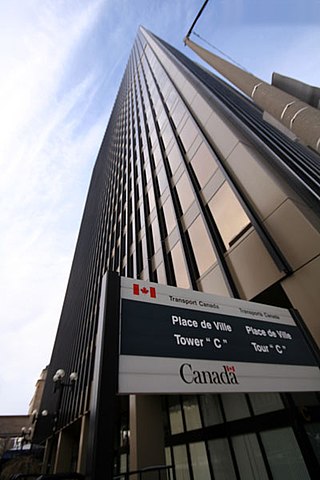
General aviation (GA) is defined by the International Civil Aviation Organization (ICAO) as all civil aviation aircraft operations except for commercial air transport or aerial work, which is defined as specialized aviation services for other purposes. However, for statistical purposes, ICAO uses a definition of general aviation which includes aerial work.

The International Civil Aviation Organization is a specialized agency of the United Nations that coordinates the principles and techniques of international air navigation, and fosters the planning and development of international air transport to ensure safe and orderly growth. The ICAO headquarters are located in the Quartier international de Montréal of Montreal, Quebec, Canada.
The Federal Aviation Regulations (FARs) are rules prescribed by the Federal Aviation Administration (FAA) governing all aviation activities in the United States. The FARs comprise Title 14 of the Code of Federal Regulations. A wide variety of activities are regulated, such as aircraft design and maintenance, typical airline flights, pilot training activities, hot-air ballooning, lighter-than-air aircraft, human-made structure heights, obstruction lighting and marking, model rocket launches, commercial space operations, model aircraft operations, Unmanned Aircraft Systems (UAS) and kite flying. The rules are designed to promote safe aviation, protecting pilots, flight attendants, passengers and the general public from unnecessary risk.

A fixed-base operator (FBO) is an organization granted the right by an airport to operate at the airport and provide aeronautical services such as fueling, hangaring, tie-down, and parking, aircraft rental, aircraft maintenance, flight instruction, and similar services. In common practice, an FBO is the primary provider of support services to general aviation operators at a public-use airport and is on land leased from the airport, or, in rare cases, adjacent property as a "through the fence operation". In many smaller airports serving general aviation in remote or modest communities, the town itself may provide fuel services and operate a basic FBO facility. Most FBOs doing business at airports of high to moderate traffic volume are non-governmental organizations, either privately or publicly held companies.

Transport Canada is the department within the Government of Canada responsible for developing regulations, policies and services of road, rail, marine and air transportation in Canada. It is part of the Transportation, Infrastructure and Communities (TIC) portfolio. The current Minister of Transport is Pablo Rodriguez. Transport Canada is headquartered in Ottawa, Ontario.

Indonesia Air Transport is an airline and aviation company based in Jakarta, Indonesia. It provides a wide range of aviation services to both the on and offshore oil, gas and mining industries within Indonesia and South-east Asia. Its main base is Halim Perdanakusuma International Airport, Jakarta. The company also maintain a secondary hub for its oil & gas industry clients in Sultan Aji Muhammad Sulaiman Airport, East Kalimantan, and operates limited scheduled services from Ngurah Rai International Airport on the island of Bali to the islands of Lombok and Flores. Indonesia Air Transport is listed in category 1 by Indonesian Civil Aviation Authority for airline safety quality. The Company provides air passenger and cargo transportation, aircraft hiring and leasing services, aircraft repairs, and training facilities. IAT also supplies aviation technical equipment and spare parts. It operates various types of fixed-wing aircraft and helicopters.

Oshawa Executive Airport is a municipal airport adjacent to the north end of the city of Oshawa, Ontario, Canada. It is the busiest general aviation airport without scheduled airline service in the Greater Toronto Area by aircraft movements and one of the busiest general aviation only airports in Canada. It includes two paved runways and instrument approaches.

SITA is a multinational information technology company providing IT and telecommunication services to the air transport industry. The company provides its services to around 400 members and 2,500 customers worldwide, which it claims is about 90% of the world's airline business. Around the world, nearly every passenger flight relies on SITA technology.

The air taxi market is an application of Advanced Air Mobility (AAM) – air transportation systems that utilize advanced technologies such as vertical takeoffs, autonomous capabilities, or fully-electric systems – for short to mid range on-demand flights. Many AAM vehicles are designed for Short Takeoff and Landing (STOL) or Vertical Takeoff and Landings (VTOL); electric VTOL aircraft are also prominent, known as eVTOLs.

The Canadian Owners and Pilots Association (COPA) is a federally registered not-for-profit association that provides information and advocacy services for Canadian pilots who fly for non-commercial purposes.
The Canadian Aviation Regulations (CARs) are the rules that govern civil aviation in Canada.
Aéropro was an air charter, aircraft maintenance and airport management company with its headquarters on the grounds of Québec City Jean Lesage International Airport in Sainte-Foy, Quebec City, Quebec, Canada. It conducted business charters and recreational and sightseeing flights across the province of Quebec. Its main base is located at Québec City Jean Lesage International Airport. The company manages several airports in Quebec.

An air operator's certificate (AOC) is the approval granted by a civil aviation authority (CAA) to an aircraft operator to allow it to use aircraft for commercial air transport purposes. This requires the operator to have personnel, assets and systems in place to ensure the safety of its employees and of the flying public. The certificate lists the approved aircraft types, each registration number approved to fly, the approved flying purpose, and in what area the holder may operate.
The Canadian Association of Rocketry - L'Association Canadienne De Fuséologie (CAR-ACF) is a Canadian federal not for profit self-supporting association and governing body representing amateur/model rocketeers across Canada. The history of amateur/ model rocketry in Canada goes back to 1965 with its approval by the Canadian Federal government with the assistance of the Canadian Aeronautics and Space Institute (CASI), the Royal Canadian Flying Clubs (RCFCA), the new Canadian Association of Rocketry (CAR), and then with the help of the Youth Aeronautic and Aerospace of Canada (YAAC). CAR-ACF was incorporated in 2009 from the then existing Canadian Association of Rocketry - CAR.
European Business Aviation Association is a non-profit association based in Belgium founded in 1977. Its more than 700 member companies cover all aspects of the business aviation sector worldwide. The EBAA's aim is to promote excellence and professionalism among its members and to ensure that aviation is properly recognized as a vital sector of the European Economy. EBAA represents corporate operators, commercial operators, manufacturers, airports, fixed-base operators, and business aviation service providers.

The Regional Aviation Association of Australia (RAAA) is a non-profit organisation representing the interests of regional aviation in Australia. RAAA has approximately 100 members and 2500 employees. They Provide air transportation in Australia for more than 2 million passengers and 23 million kilograms cargo per year.
The Guild of Air Traffic Control Officers (GATCO) is a guild of air traffic controllers which began organising in 1952 and was established in 1954. In 2004, it had over 2000 members spread over 125 locations in the UK and overseas in both civilian and military sectors.
The General Civil Aviation Authority is the civil aviation authority of the United Arab Emirates (UAE). Its head office is in Al Rawdah, Abu Dhabi.
Airports Council International Europe is a European industry trade association which advances the collective interests of Europe's airports and promotes professional excellence in airport management and operations. The members are over 600 airport operators of all sizes in 58 European countries, over 90% of commercial air traffic in Europe. ACI EUROPE member airports welcomed over 2.3 billion passengers and handled 17 million metric tonnes of cargo and nearly 45 million aircraft movements each year since 1990.
Wings Field is a general aviation airport in Blue Bell, in Whitpain Township in Montgomery County, Pennsylvania, and serves the western and northern Philadelphia suburbs. The airport was founded in 1928. It is located about three miles (5 km) northwest of the Philadelphia city limits.